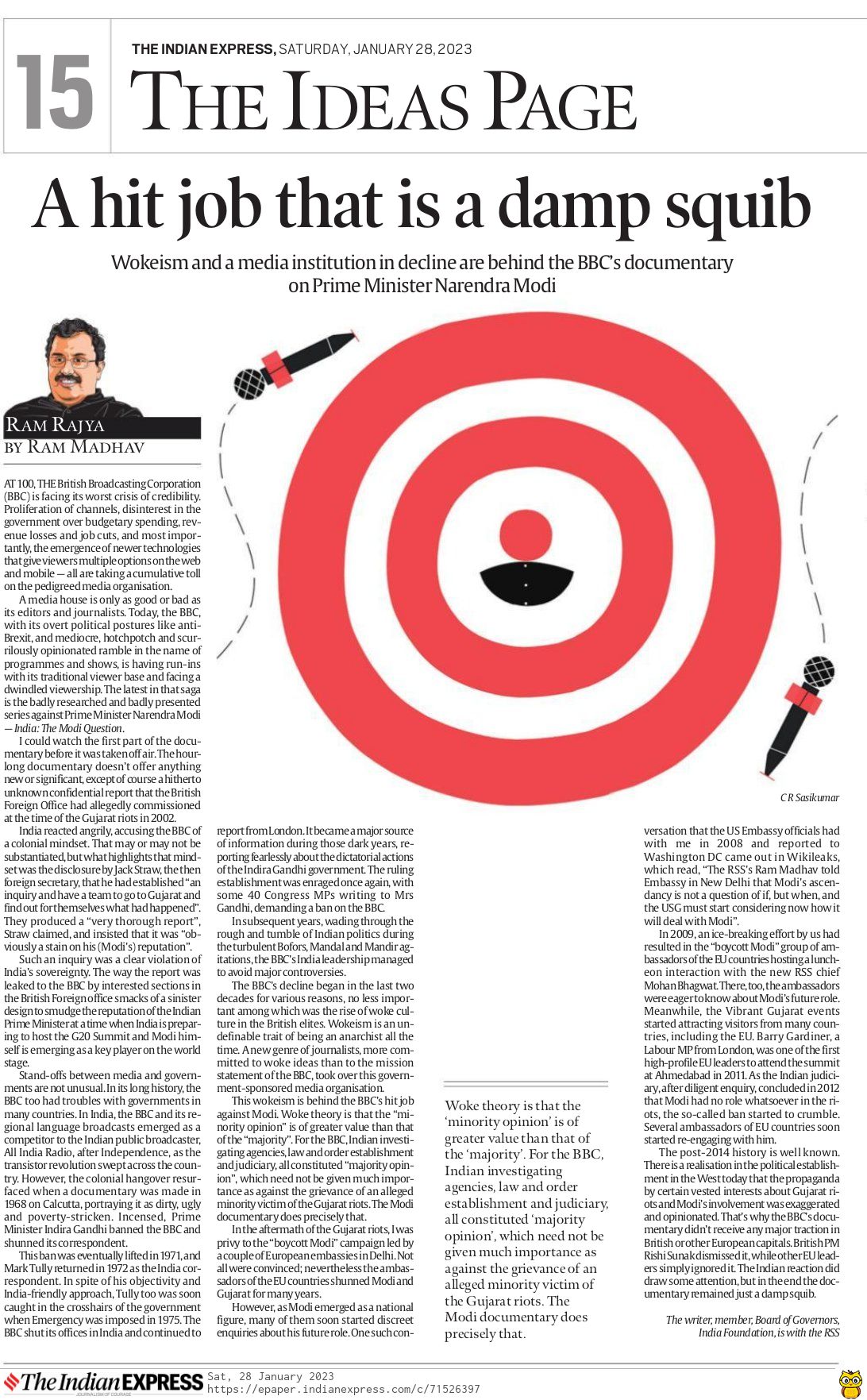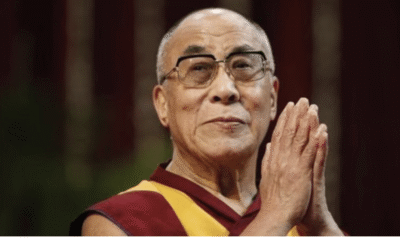
|
Getting your Trinity Audio player ready...
|
(The article was originally published by Indian Express on January 28, 2023 as a part of Dr Madhav’s bi-weekly column titled ‘Ram Rajya’. Views expressed are personal.)
At 100, the British Broadcasting Corporation (BBC) is facing its worst crisis of credibility. Proliferation of channels, disinterest in the government over budgetary spending, revenue losses and job cuts, and most importantly, the emergence of newer technologies that give viewers multiple options on the web and mobile — all are taking a cumulative toll on the pedigreed media organisation.
A media house is only as good or bad as its editors and journalists. Today, the BBC, with its overt political postures like anti-Brexit, and mediocre, hotchpotch and scurrilously opinionated ramble in the name of programmes and shows, is having run-ins with its traditional viewer base and facing a dwindled viewership. The latest in that saga is the badly researched and badly presented series against Prime Minister Narendra Modi — “India: The Modi Question”.
I could watch the first part of the documentary before it was taken off air. The hour-long documentary doesn’t offer anything new or significant, except of course a hitherto unknown confidential report that the British Foreign Office had allegedly commissioned at the time of the Gujarat riots in 2002.
India reacted angrily, accusing the BBC of a colonial mindset. That may or may not be substantiated, but what highlights that mindset was the disclosure by Jack Straw, the then foreign secretary, that he had established “an inquiry and have a team to go to Gujarat and find out for themselves what had happened”. They produced a “very thorough report”, Straw claimed, and insisted that it was “obviously a stain on his (Modi’s) reputation”.
Such an inquiry was a clear violation of India’s sovereignty. The way the report was leaked to the BBC by interested sections in the British Foreign office smacks of a sinister design to smudge the reputation of the Indian Prime Minister at a time when India is preparing to host the G-20 Summit and Modi himself is emerging as a key player on the world stage.
Stand-offs between media and governments are not unusual. In its long history, the BBC too had troubles with governments in many countries. In India, the BBC and its regional language broadcasts emerged as a competitor to the Indian public broadcaster, All India Radio, after Independence, as the transistor revolution swept across the country. However, the colonial hangover resurfaced when a documentary was made in 1968 on Calcutta, portraying it as dirty, ugly and poverty-stricken. Incensed, Prime Minister Indira Gandhi banned the BBC and shunned its correspondent.
This ban was eventually lifted in 1971, and Mark Tully returned in 1972 as the India correspondent. In spite of his objectivity and India-friendly approach, Tully too was soon caught in the crosshairs of the government when Emergency was imposed in 1975. The BBC shut its offices in India and continued to report from London. It became a major source of information during those dark years, reporting fearlessly about the dictatorial actions of the Indira Gandhi government. The ruling establishment was enraged once again, with some 40 Congress MPs writing to Mrs Gandhi, demanding a ban on the BBC.
In subsequent years, wading through the rough and tumble of Indian politics during the turbulent Bofors, Mandal and Mandir agitations, the BBC’s India leadership managed to avoid major controversies.
The BBC’s decline began in the last two decades for various reasons, no less important among which was the rise of woke culture in the British elites. Wokeism is an undefinable trait of being an anarchist all the time. A new genre of journalists, more committed to woke ideas than to the mission statement of the BBC, took over this government-sponsored media organisation.
This wokeism is behind the BBC’s hit job against Modi. Woke theory is that the “minority opinion” is of greater value than that of the “majority”. For the BBC, Indian investigating agencies, law and order establishment and judiciary, all constituted “majority opinion”, which need not be given much importance as against the grievance of an alleged minority victim of the Gujarat riots. The Modi documentary does precisely that.
In the aftermath of the Gujarat riots, I was privy to the “boycott Modi” campaign led by a couple of European embassies in Delhi. Not all were convinced; nevertheless the ambassadors of the EU countries shunned Modi and Gujarat for many years.
However, as Modi emerged as a national figure, many of them soon started discreet enquiries about his future role. One such conversation that the US Embassy officials had with me in 2008 and reported to Washington DC came out in Wikileaks, which read, “The RSS’s Ram Madhav told Embassy in New Delhi that Modi’s ascendancy is not a question of if, but when, and the USG must start considering now how it will deal with Modi”.
In 2009, an ice-breaking effort by us had resulted in the “boycott Modi” group of ambassadors of the EU countries hosting a luncheon interaction with the new RSS chief Mohan Bhagwat. There, too, the ambassadors were eager to know about Modi’s future role. Meanwhile, the Vibrant Gujarat events started attracting visitors from many countries, including the EU. Barry Gardiner, a Labour MP from London, was one of the first high-profile EU leaders to attend the summit at Ahmedabad in 2011. As the Indian judiciary, after diligent enquiry, concluded in 2012 that Modi had no role whatsoever in the riots, the so-called ban started to crumble. Several ambassadors of EU countries soon started re-engaging with him.
The post-2014 history is well known. There is a realisation in the political establishment in the West today that the propaganda by certain vested interests about Gujarat riots and Modi’s involvement was exaggerated and opinionated. That’s why the BBC’s latest documentary didn’t receive any major traction in British or other European capitals. British PM Rishi Sunak dismissed it, while other EU leaders simply ignored it. The Indian reaction did draw some attention, but in the end the documentary remained just a damp squib.




